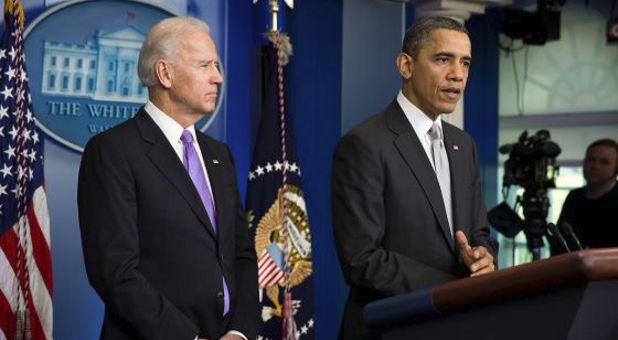Obama Meets American Jewish Leaders Ahead of Israel Trip
President Barack Obama hosted leaders of major American Jewish organizations at the White House on Thursday as he sought to smooth the way for his first presidential visit to Israel later this month.
The meeting was a chance for Obama to preview his agenda for the trip, which aides have said will include a heavy emphasis on efforts to curb Iran’s nuclear program as well as discussion of deadlocked Israeli-Palestinian peace moves and Syria’s civil war.
Obama’s outreach to prominent figures in the Jewish community could help ease any residual tensions following the 2012 election campaign. Republicans had accused the Democratic president of not being sufficiently supportive of Israel, Washington’s closest ally in the Middle East.
Obama used Thursday’s talks to reiterate his “unshakeable support” for Israel, a White House official said. The president’s aides have insisted that U.S.-Israeli ties have remained on solid ground despite his history of testy relations with Israeli Prime Minister Benjamin Netanyahu.
While the White House has denied that Obama will present his own peace plan during the trip, the president made clear he will not shy away from the issue and left open the possibility of a more concerted diplomatic push at a later time, a source knowledgeable about the meeting told Reuters.
Obama told the leaders he wanted to speak directly to the Israeli people and, in a major address in Jerusalem, will urge them to work for peace with the Palestinians, the source said.
When challenged on why Obama had not sharpened his threat against Iran even further than he had, as the hawkish Netanyahu has urged, Obama defended his focus on sanctions and diplomacy and said he wanted to keep options open for a peaceful resolution, the source said.
Vice President Joe Biden told a conference of America’s largest pro-Israel lobby on Monday that Obama was “not bluffing” about resorting to military force against Iran if all else fails to halt Iran’s nuclear advance. Tehran denies seeking a bomb.
At the White House meeting, Obama played down disagreement with Netanyahu over how to deal with Iran’s nuclear program and suggested that differences among Israelis themselves were greater, the source said. Netanyahu has strongly hinted at the possibility of an Israeli strike on Iran’s nuclear sites, but has not signaled that such an attack might be imminent.
Diverse Jewish Groups at Meeting
The White House declined to release a list of participants, who numbered more than a dozen and spanned the political spectrum. It has yet to officially announce the dates of Obama’s trip, which will include the West Bank and Jordan. Israeli media have reported he will start his visit there on March 20.
Among the groups represented on Thursday were the American Israel Public Affairs Committee, B’nai B’rith, the Simon Wiesenthal Center, the American Jewish Committee and J Street. Famed attorney Alan Dershowitz and former Democratic congressman Robert Wexler were also present, the source said.
“President Obama invited leaders from across the American Jewish community to discuss and get input about his upcoming trip to Israel,” the official said.
“The president noted that the trip is not dedicated to resolving a specific policy issue, but is rather an opportunity to consult with the Israeli government about a broad range of issues – including Iran, Syria, the situation in the region, and the peace process,” the official said.
Such groups carry weight with Republicans and Democrats alike in Congress and with a range of parties in Israel, where Netanyahu is struggling to forge a new coalition government after a weaker-than-expected showing in January’s election.
Some of Israel’s U.S. supporters had complained during the U.S. presidential campaign that Obama, during his first term, had been too tough on its close ally.
But Obama won praise for backing Israel in its brief war against Hamas in the Gaza Strip late last year and staunchly opposing Palestinian statehood bids at the United Nations.
However, at the start of Obama’s second term, several conservative Jewish leaders criticized his choice of Chuck Hagel as defense secretary due to comments the former senator had made about the influence of pro-Israel lobbying groups in Washington.
Exit polls from the November U.S. election showed Obama winning about 70 percent of the Jewish vote. That compared to estimates varying from 74 to 78 percent in the 2008 contest.
Obama’s trip to Israel will be his first since taking office in 2009. His Republican predecessor, George W. Bush, also waited until his second term to visit the Jewish state.
Reporting by Matt Spetalnick; Editing by Cynthia Osterman and Lisa Shumaker
© 2013 Thomson Reuters. All rights reserved.















































